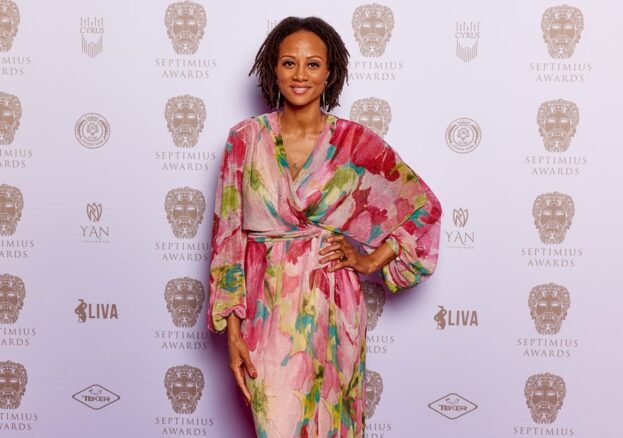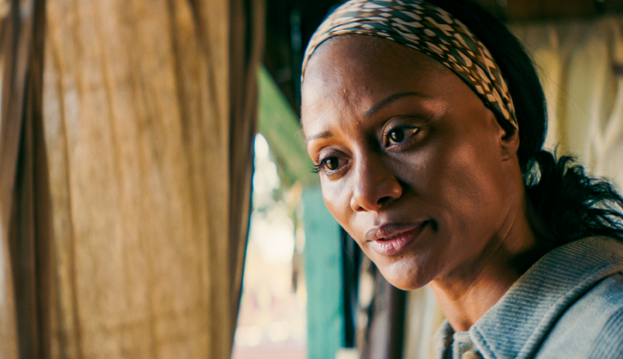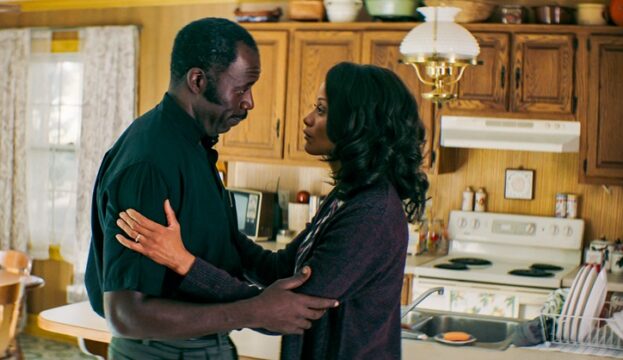
Nika King’s portrayal of First Lady Donna Martin in Sound of Hope is a deeply personal and powerful performance. Drawing from her own experiences and beliefs, Nika shares the significance of this role, its connection to Black history, and how she hopes to inspire future generations of Black creatives. Through her work, she continues to blend art with activism, championing stories that resonate and drive social change.
What initially drew you to the role of First Lady Donna Martin in Sound of Hope, and how did her story resonate with your own beliefs and experiences?
First Lady Donna Martin’s journey resonated deeply with my own experiences being fostered as a child. I immediately connected with her strength, compassion, and unwavering belief in God. Like First Lady, I have often found myself in situations where I had to fight for God’s calling on my life. Her journey gave me permission to keep fighting for what I believe in.

As an actress portraying strong Black women, such as Donna Martin in Sound of Hope, how do you feel these roles contribute to the larger narrative of Black history and culture?
I feel these roles provide a counter-narrative to the often one-dimensional stereotypical portrayals of Black women in media. Roles like First Lady Donna Martin are a celebration of the countless Black women who have been at the forefront of change, often without receiving the recognition they deserve. It’s time we give her all the flowers.
Black History Month is a time to reflect on the achievements of Black leaders. How does your portrayal of Donna Martin reflect the legacy of Black women who have made significant contributions to their communities?
I am beyond honoured to portray this dynamic Woman of God. By bringing her story to life, we get to inspire others to see the richness of our history and culture. By embodying nuanced and complex characters like First Lady Donna Martin, I have the opportunity to highlight the strength and commitment that have defined Black women throughout history.
In Sound of Hope, faith and community are central to the story. How do you think the film speaks to the historical and current role of the Black church in supporting and uplifting vulnerable children, especially within the Black community?
Historically, the Black church has been a cornerstone of the community, but I feel that has changed dramatically. It seems like they’ve forgotten about the people Jesus said we should be taking care of. There should be more churches involved to help solve the foster care crisis. Every church, whether Black or White, should be concerned about helping families and vulnerable children. It’s our duty as followers of Christ.
Portraying real-life trauma, particularly in scenes involving foster children, must have been emotionally intense. How did you prepare for these moments, and what impact did they have on you personally?
Portraying real-life trauma required a deep level of emotional preparation and sensitivity. I knew these moments had to be handled with authenticity and care because they actually happened to the families and children living in Possum Trot. I wanted to get it right; I had to get it right. Creating a safe space where everyone felt comfortable to bring their A-game was important. We laughed and joked, but when it was time to do those difficult scenes full of raw emotions, we all knew this was bigger than us.
You’ve been involved in a variety of projects, from comedy to drama. How did your experience on Sound of Hope compare to other roles, such as your work in Euphoria, and how has it shaped your approach to acting?
My experience on Sound of Hope was truly unique because it was a true story. It significantly shaped my approach to acting in ways that were both challenging and transformative. It wasn’t just about delivering lines or playing a part—it was about fully inhabiting a woman who carries the weight of her community and personal struggles while maintaining grace and determination.
Black History Month encourages us to look at both the past and the future. How do you hope your work, especially in films like Sound of Hope, will inspire the next generation of Black storytellers and leaders?
Black History Month is a time to honour the legacy of those who came before us and to imagine the possibilities for those who will come after. Through my work, I hope to inspire the next generation to embrace their voices, tell their own stories, and continue to push boundaries in how our narratives are told. I hope my career encourages them to be bold, to take up space unapologetically, and to challenge the status quo by bringing fresh narratives to film, writing, art, or any other medium.
Given your advocacy for mental health and social issues, how does a project like Sound of Hope align with your mission as both an actress and activist?
For me, advocacy is about creating spaces for underrepresented voices to be heard and recognised. Sound of Hope humanises the issues that are prevalent in this country and attempts to break down the stigma surrounding mental health and racism. Sound of Hope aligns with my mission of merging art with activism, showing how powerful storytelling can be when it comes to shaping perceptions, inspiring empathy, and driving social change.
Looking back at your career, which Black creatives have inspired you the most, and how do you honour their legacy through your work and the roles you choose?
Pioneers like Cicely Tyson have left an indelible mark on me. She inspired me with her unwavering commitment to portraying strong, complex Black women who defied the stereotypes that Hollywood often imposes. She chose roles that told the truth of our experiences, ones that reflected both the pain and triumph of being a Black woman in America. I honour her legacy by being intentional with the roles I choose and the stories I tell.
What advice would you give to young Black creatives who want to make their mark in the entertainment industry, particularly those who want to tell stories that celebrate Black culture and address critical social issues?
My advice is to not let Hollywood put you in a box or dilute your stories to fit a certain agenda. Resist that. Know that there is strength in your truth, and the world is hungry for diverse and different stories from Black creatives. Bring your full self to your work, embrace your heritage, and don’t be afraid to explore the depth and complexity of the Black experience—its beauty, its struggles, and its realness.
Sound of Hope: The Story of Possum Trot will be in UK and Irish cinemas from 11th October, to find out more and purchase your tickets visit www.soundofhopemovie.co.uk

